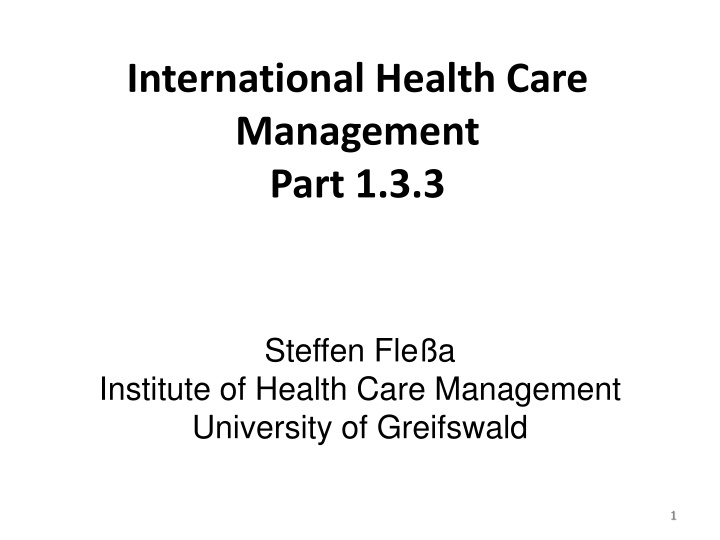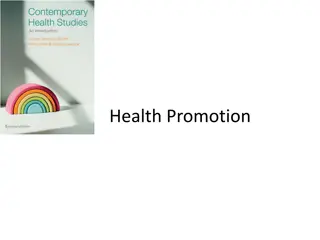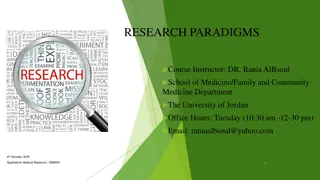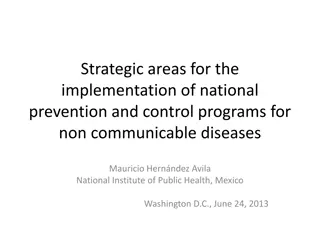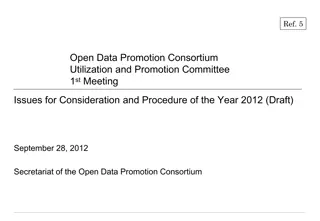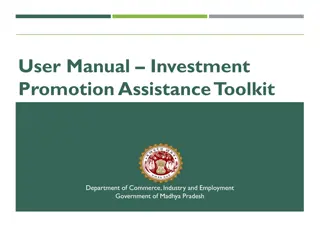International Health Care Management Part 1.3.3: Health Promotion Paradigms and Ottawa Charter
Health promotion involves enabling individuals to enhance control over their health and well-being, emphasizing social resources and personal capacities. It extends beyond treatment to address root causes of ill health, focusing on prevention and holistic well-being. Learn about the concepts, definition, and elements of health promotion shaping global policies and practices.
Download Presentation

Please find below an Image/Link to download the presentation.
The content on the website is provided AS IS for your information and personal use only. It may not be sold, licensed, or shared on other websites without obtaining consent from the author.If you encounter any issues during the download, it is possible that the publisher has removed the file from their server.
You are allowed to download the files provided on this website for personal or commercial use, subject to the condition that they are used lawfully. All files are the property of their respective owners.
The content on the website is provided AS IS for your information and personal use only. It may not be sold, licensed, or shared on other websites without obtaining consent from the author.
E N D
Presentation Transcript
International Health Care Management Part 1.3.3 Steffen Fle a Institute of Health Care Management University of Greifswald 1
1.3 Concepts 1 International Public Health 1.1 Background 1.2 Health and Development 1.3 Concepts 1.3.1 Prevention 1.3.2 Primary Health Care 1.3.3 Health Promotion 1.3.4 Recent Developments 2
1.3.3 Health Promotion Paradigms: Pathogenesis Biological mechanism that leads to a diseased state Why do people fall sick? Salutogenesis Medical approach focusing on factors that support human health and well-being rather than on factors that cause disease How and where is health improved? Politics: First Internationale Conference on Health Promotion, WHO-meeting in Ottawa, 1986 World Health Assembly 1989: Approval of Ottawa Charter 3
Definition Health promotion is the process of enabling people to increase control over, and to improve, their health. To reach a state of complete physical mental and social wellbeing, an individual or group must be able to identify and to realize aspirations, to satisfy needs, and to change or cope with the environment. Health is, therefore, seen as a resource for everyday life, not the objective of living. Health is a positive concept emphasizing social and personal resources, as well as physical capacities. Therefore, health promotion is not just the responsibility of the health sector, but goes beyond healthy lifestyles to wellbeing. (Ottawa Charter, 1986) Health promotion enables people to increase control over their own health. It covers a wide range of social and environmental interventions that are designed to benefit and protect individual people s health and quality of life by addressing and preventing the root causes of ill health, not just focusing on treatment and cure. (https://www.who.int/news-room/q-a-detail/what-is-health- promotion) 4
Elements Good governance for health Health promotion requires policy makers across all government departments to make health a central line of government policy. This means they must factor health implications into all the decisions they take, and prioritize policies that prevent people from becoming ill and protect them from injuries. These policies must be supported by regulations that match private sector incentives with public health goals (e.g. tax policies on unhealthy or harmful products such as alcohol, tobacco, etc. Health literacy People need to acquire the knowledge, skills and information to make healthy choices, for example about the food they eat and healthcare services that they need. They need to have opportunities to make those choices. And they need to be assured of an environment in which people can demand further policy actions to further improve their health. Settings Cities, regions, hospitals, schools, and other settings play a major role in promoting good health. Strong leadership and commitment is essential to health https://www.who.int/news-room/q-a-detail/what-is-health-promotion# 5
Health Promotion Strategies build healthy public policy Not only health policy but healthy public policy! create supportive environments Healthy worlds of living strengthen community action healing community develop personal skills health literacy reorient health services Towards health promotion and prevention instead of curative medicine Including all other services impacting on health https://thelearner101.wordpress.com/2018/10/26/eds-143-module-3- health-education-and-health-promotion/ 6
Public Policy (e.g. banning public smoking) Health Governance Economic Regulation (e.g. tax on alcohol and tobacco) Health Promotion and Organisational Development (e.g. health promoting schools) Primary Prevention (e.g. vaccination programs) Prevention Secondary Prevention (e.g. cancer screening programs) Prevention Health Promotion Community Based Work (e.g. public transport) Tertiary Prevention (e.g. rehabilitation) Environmental Health (e.g. reused bags) https://www.slideshare.net/DrRoohiBanu/principles-of- health-promotion-disease-prevention Health Education (e.g. Sexual Education) 7
Examples Healthy Cities Health Promoting Regions Healthy Schools Health Promoting Hospitals Occupational Health ... 8
1.3 Concepts 1 International Public Health 1.1 Background 1.2 Health and Development 1.3 Concepts 1.3.1 Prevention 1.3.2 Primary Health Care 1.3.3 Health Promotion 1.3.4 Recent Developments 9
